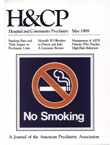Medication Refusal and the Rehospitalized Mentally Ill Inmate
Abstract
Records of all inmates committed to a state forensic hospital in fiscal year 1982 (N=472) were studied to examine the inmates' hospital utilization between September 1977 and April 1984 and the reasons for their admissions. Medication refusal, hallucinations and delusions, and threatened or potential violent behavior toward others were the most frequently documented reasons for admission. Medication refusal was associated with a greater number of hospitalizations, shorter hospitalizations, diagnoses of paranoid schizophrenia or schizophreniform disorders, longer prison sentences, and convictions for more serious felonies. Inmates admitted for medication refusal were also likely to be referred concurrently for threatened or potential violent behavior toward others. The study demonstrates the particularly violent nature of a large proportion of the hospitalized mentally ill inmates and the important role of medication refusal in their rehospitalization.
Access content
To read the fulltext, please use one of the options below to sign in or purchase access.- Personal login
- Institutional Login
- Sign in via OpenAthens
- Register for access
-
Please login/register if you wish to pair your device and check access availability.
Not a subscriber?
PsychiatryOnline subscription options offer access to the DSM-5 library, books, journals, CME, and patient resources. This all-in-one virtual library provides psychiatrists and mental health professionals with key resources for diagnosis, treatment, research, and professional development.
Need more help? PsychiatryOnline Customer Service may be reached by emailing [email protected] or by calling 800-368-5777 (in the U.S.) or 703-907-7322 (outside the U.S.).



